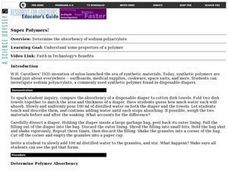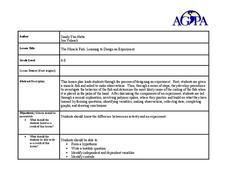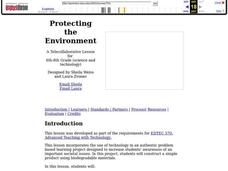Cornell University
Polymers: Making Silly Putty
Putty is proof that learning can be fun! Share the wonderful world of polymers with your class through an experiment. Young scientists create their own silly putty, then examine its properties.
Curated OER
Degradation and Weathering of Polymeric Materials
Students investigate issues of degradation and weathering of polymeric materials during their useful life. They evaluate photodegradable plastics and their viability as an environmental solution for litter and investigate the qualitative...
Curated OER
Super Polymers
Students investigate polymers and compare the absorbency of a disposable diaper to cotton dish towels They determine the absorbency of sodium polyacrylate.
Curated OER
Disposable Diaper Comparison and Mystery Powder Identification
Students investigate which diaper is the most absorbent. In this chemistry lesson, students calculate how much water is absorbed by diapers. They identify an unknown powder based on physical and chemical properties.
Curated OER
How to Clean Up an Oil Slick
Students explore how an oil spill is contained and cleaned up. They investigate an oil absorbing polymer that is hydrophobic, absorbs up to 19 times its own weight in nonpolar liquids, floats on water, and can be reused or disposed of by...
Curated OER
What Is Special About Polyethylene Food Storage Bags?
Learners participate in an investigation in which they compare a polyethylene bag designed for recycling or disposal with a polyethylene food storage bag. Students use hexane to determine the differences between the low density...
Curated OER
The Miracle Fish: Learning to Design an Experiment
Students develop procedures to explore the behavior of fish. In this scientific experiment lesson students from a hypothesis, write a question, identify different variables and controls in their experiment.
Cornell University
Polymerization
Explore condensation polymerization and additive polymerization through hands-on activities. Young scholars first model additive polymerization with paperclips. They finish the activity by using condensation polymerization to create a...
Curated OER
Rechargeable Batteries
Students explore how rechargeable batteries work by conducting a series of experiments. In this physics lesson plan, students discuss the benefits of using rechargeable batteries over disposable ones. They build their own battery charger...
Curated OER
Diaper Challenge
Young scholars compare the absorbency of a regular diaper and a swim diaper in fresh water and salt water. In this absorbency lesson plan, students mass the diapers and place them in water and determine the change in mass. They do the...
Curated OER
A Comparison of Polymeric Liquids with Newtonian Liquids
Students concretely illustrate and define a macromolecule, observe the unique behavior of polymers and relate to their knowledge of molecules, and use the scientific process to determine the difference between Newtonian and non-Newtonian...
Curated OER
Polystyrene Containers
Students conduct experiments to determine the effectiveness of polystyrene containers at preventing heat loss. In this polymers instructional activity, students design an experiment to determine how effective Styrofoam burger containers...
Curated OER
Introduction and Making Textured Beads
Students explore the basics of working with polymer clay. They experiment with textures, inclusions. Students explore adding sand or glitter to their inclusions. Students create textured beads from the clay.
Curated OER
Protecting the Environment
Learners explain what biodegradable materials are and list examples of them. They design, with online partners' feedback and input, a product made of biodegradable materials and develop a marketing campaign to best sell their product.
Curated OER
Biodegradability
Students study the effects of water, salt water and heat on common household materials. They separate an emulsion and show that the materials are completely recoverable and observe the effect of acetone and water on polystyrene.
Curated OER
Adventures With Super-Absorbers and Substance Solubility
Learners understand the concepts of absorption, swellability and solubility and recognize that science is all around us in our everyday lives and is fun to explore.
Curated OER
A Comparison of Polymeric Liquids with Newtonian Liquids
Students perform several tests on liquids. In this general science lesson, students compare the properties of polymeric and nonpolymeric liquids. They explain the composition and importance of macromolecules.
Curated OER
One Plus One Makes New
Students discover the properties of matter and how they change when composite materials are produced. For this informative lesson students write up a question and procedure to an experiment then analyze and draw conclusions based...
Curated OER
Specific Gravity-The Relative Density of Liquids
Students explore a hydrometer. In this gravity lesson plan students construct a hydrometer and create a liquid density column.
Curated OER
You Are What You Eat!
Students calculate the calories in food samples and plan a meal based on the calorie amount. In this calories lesson plan, students also devise a work out program to burn off the calories.
Curated OER
Analagous Colors
Middle schoolers encounter how to mix analogous colors and use them in cane patterns. They select two colors that are next to each other on the color wheel. Students then knead the pieces for a couple of minutes and then roll each color...






















